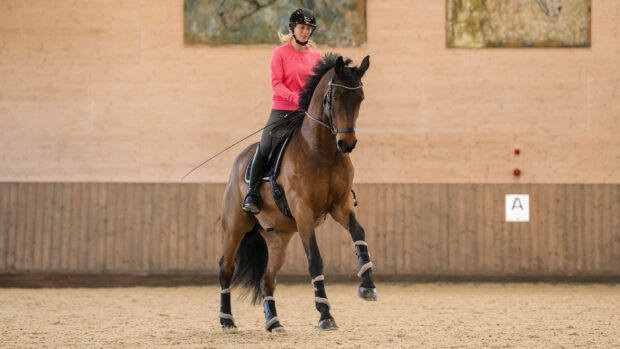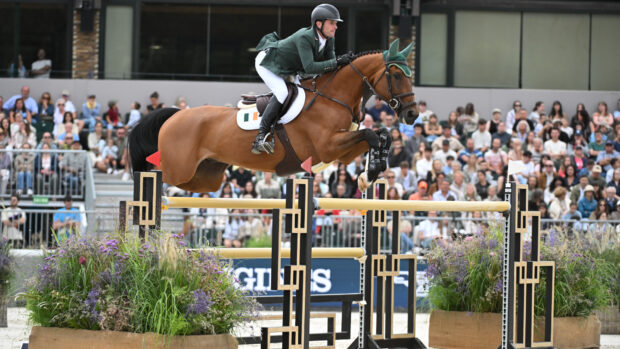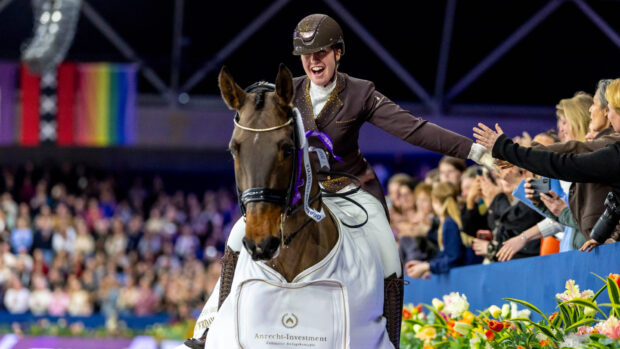Go back 10 years and had anyone mentioned the words “social licence” in relation to equestrianism, there would have been blank looks all round. Today, most of the industry has come or is starting to come round to the fact that this is an issue that isn’t going to go away.
So what is social licence to operate?
“Most societies regulate human activities using laws that state clearly what is, and is not, legally permissible,” Roly Owers, Madeleine Campbell and Janet Douglas state in their 2022 published study on the topic. “However, there is a second layer of permission that is granted – or revoked – by the public.”
This “second layer” is social licence, which, the authors explain, “represents an intangible, implicit agreement between the public and an industry or group”.
“The public may approve of an activity, in which case it can proceed with minimal formalised restrictions, or it may disapprove, and this may herald legal restrictions, or even an outright ban.”
If this seems an extreme or negative view, or scaremongering, think back less than two years, to the protests at the Grand National. Animal Rising, the group behind the demonstrations, wanted to highlight the “broken relationship” between humans and animals.
Protestors, people who want horse sport banned, are in the minority, but they are vocal and capable of influencing others. Three years running, World Horse Welfare has conducted research to find out what the public thinks of horse sport and the figures have stayed at roughly the same levels; about 20% do not support it in any circumstances, and another 40% would only support it if horse welfare is improved. If these 40% can be convinced that horse welfare is, as it should always be, the highest priority of all in the sport, we carry on.
So how to convince those people? How do we get more of the public on side?
Social relevance
Riding for the Disabled Association (RDA) CEO Michael Bishop, an amateur event rider, believes horses’ social relevance is key. The more people who have horses in their lives, the more supporters equestrianism has.
{"content":"PHA+4oCcQSBjb3JlIHBhcnQgb2YgdGhpcyBpcyBhIHNvY2lldGFsIGNvbm5lY3Rpb24gd2l0aCBob3JzZXMs4oCdIE1pY2hhZWwgdG9sZCA8ZW0+SCZhbXA7SDwvZW0+LiDigJxXZSBoYXZlIHRvIGZpbmQgd2F5cyBvZiByZWFjaGluZyBvdXQgdG8gcGVvcGxlIGFuZCBlbmdhZ2luZyB0aGVtIHdpdGggaG9yc2VzIHNvIHRoZXkgdW5kZXJzdGFuZCB3aGF0IHdl4oCZcmUgdHJ5aW5nIHRvIGRvIGFuZCBob3cgcG93ZXJmdWwgdGhhdCBib25kIGFuZCByZWxhdGlvbnNoaXAgaXMuPC9wPgoKPHA+4oCcQWxsIG9mIHVzIGNhbiBoYXZlIGEgcm9sZSBpbiB0aGF0LCBiZWNhdXNlIGFsbCBvZiB1cyBtaWdodCBiZSBhYmxlIHRvIGNvbnRyaWJ1dGUgc29tZXRoaW5nIHRvIHRoZSBsb2NhbCBSREEgZ3JvdXAsIHJpZGluZyBzY2hvb2wsIEJIUyBjZW50cmUsIHdoYXRldmVyIGVuZGVhdm91ciB0aGF0IGNvbm5lY3RzIHBlb3BsZSB0byBob3JzZXMuIFdlIGhhdmUgYSBkdXR5IGFuZCByZXNwb25zaWJpbGl0eSwgSSB0aGluaywgdG8gbWFrZSBzdXJlIHRoZXJl4oCZcyBhIHNvY2lhbCByZWxldmFuY2UgY29ubmVjdGlvbiB0aGF0IGJyaW5ncyBob3JzZXMgdG8gdGhlIGF0dGVudGlvbiBhbmQgcG9zaXRpdmUgaW50ZXJlc3Qgb2Ygd2lkZXIgc29jaWV0eS7igJ08L3A+CjxwPk1pY2hhZWwgZG9lcyBub3QgYmVsaWV2ZSB0aGlzIGNhbiBiZSBkb25lIGJ5IHNpdHRpbmcgaW4gb3VyIGl2b3J5IHRvd2VyIOKAkyBvciB0YWNrIHJvb20g4oCTIGFuZCBzaG93aW5nIHRoZSB3aWRlciB3b3JsZCB3aGF0IHdlIGRvIGFuZCBob3cgZ29vZCBpdCBpcy48L3A+Cgo8cD7igJxXZSBoYXZlIHRvIGRvIGl0IGJ5IHNheWluZyDigJhIZXJlIGFyZSB0aGUgY2hhbGxlbmdlcyB0aGF0IHNvY2lldHkgZmFjZXPigJks4oCdIGhlIHNhaWQuIOKAnEJlIHRoYXQgbG9uZWxpbmVzcywgb3IgYWNjZXNzIHRvIHBoeXNpY2FsIGV4ZXJjaXNlIGZvciBkaXNhYmxlZCBwZW9wbGU7IGhlcmXigJlzIGEgd2F5IHdoZXJlIGhvcnNlcyBhcmUgd2VsbCBwbGFjZWQgYW5kIGVxdWlwcGVkIHRvIHN1cHBvcnQgdGhvc2UgY2hhbGxlbmdlcy4gRXZlcnlvbmUgd2hv4oCZcyBlbmdhZ2VkIGluIGhvcnNlcyB1bmRlcnN0YW5kcyBzb21lIG9mIHRob3NlIHNvY2lldGFsIGNoYWxsZW5nZXMsIGJlY2F1c2Ugd2XigJlyZSBhbGwgZmFjaW5nIHRoZW0uIEV4cGxvcmluZyB0aGUgcm9sZSBvZiBob3N0aW5nIHRoYXQgYW5kIHN1cHBvcnRpbmcgdGhlIGdyb3Vwcywgb2YgY291cnNlIGxpa2UgUkRBLCB3aG8gZGVsaXZlciBvbiB0aGF0LCBJIHRoaW5rIGlzIHBhcmFtb3VudC7igJ08L3A+CjxwPlNvIHRoaXMgaXMgc29tZXRoaW5nIGV2ZXJ5b25lIGNhbiBkbzsgaWYgZXZlcnkgaG9yc2Ugb3duZXIgaGFzIGFuIG9wcG9ydHVuaXR5IHRvIGVuZ2FnZSBhIG5vbi1ob3JzZXkgbWVtYmVyIG9mIHRoZSBwdWJsaWMsIHBlcmhhcHMgdGhpcyBpcyBub3QgYSBkdXR5LCBidXQgYW4gb3Bwb3J0dW5pdHksIHRvIGJyaW5nIHNvbWVvbmUgbmV3IG9uIGJvYXJkLjwvcD4KPHA+TWljaGFlbCBtZW50aW9uZWQgUGFyayBMYW5lIFJEQSBpbiBUZWRkaW5ndG9uLCBMb25kb24sIHdoaWNoIGhhcyBhIHN0YWJsZSB3aXRoIGEgd2luZG93IG92ZXJsb29raW5nIHRoZSBzdHJlZXQuIFdoaWNoZXZlciBob3JzZSBpcyBpbiB0aGVyZSBjYW4gbG9vayBvdmVyIHRoZSDigJxjdWRkbGUgZG9vcuKAnSwgYWxsb3dpbmcgY2l0eSBwYXNzZXJzLWJ5IGEgcXVpY2sgZ2xpbXBzZSBpbnRvIHRoZSBlcXVlc3RyaWFuIHdvcmxkLjwvcD4KPHA+4oCcWW91IHdhdGNoIGtpZHMgZ29pbmcgdG8gc2Nob29sLCBwZW9wbGUgb24gdGhlaXIgd2F5IHRvIHdvcmssIHRha2luZyBhIGRpdmVyc2lvbiBkb3duIHRoaXMgdW5hc3N1bWluZyBzdWJ1cmJhbiBzdHJlZXQgdG8gcGF0IHRoZSBwb255LOKAnSBNaWNoYWVsIHNhaWQuIOKAnEl04oCZcyBhIHJlYWxseSBnb29kIGV4YW1wbGUgb2YgYSBzbWFsbCBiaXQgb2YgcHJhY3RpY2UgY2hhbmdlIHRoYXQgaXMgZW5nYWdpbmcgbW9yZSBwZW9wbGUgd2l0aCBob3JzZXMsIGFuZCBJIHRoaW5rIGl04oCZcyBhIHJlYWxseSBwb3dlcmZ1bCBzdG9yeS4gSXTigJlzIG1hZGUgYSBob3JzZSByZWxldmFudC7igJ08L3A+CjxwPkV2ZXJ5b25lIGluIHRoZSBpbmR1c3RyeSBoYXMgY29ubmVjdGlvbnMgd2l0aCBwZW9wbGUgb3V0c2lkZSBpdCwgYW5kIHNvIGFsbCBvZiB1cyBhcmUgYWR2b2NhdGVzOyB3ZSBoYXZlIGEgcmVzcG9uc2liaWxpdHksIE1pY2hhZWwgYmVsaWV2ZXMsIHRvIHNoYXJlIHRoZSBwb3dlciBvZiBob3JzZXMgaW4gYSB3YXkgdGhhdOKAmXMgcmVsZXZhbnQgdG8gb3RoZXJzLiBJZiBlYWNoIG9mIHVzIGNhbiBjb252aW5jZSBvbmUgcGVyc29uLCB0aGUgY3VtdWxhdGl2ZSBlZmZlY3Qgd291bGQgYmUgaHVnZS48L3A+CjxoMz5DaGFuZ2luZyBtaW5kczwvaDM+CjxwPkVxdWVzdHJpYW5pc20gaXMgZmFyIGZyb20gdGhlIGZpcnN0IGluZHVzdHJ5IHRvIGV4cGVyaWVuY2UgdGhlIHByZXNzdXJlIG9mIHB1YmxpYyBvcGluaW9uLCBhbmQgbWFueSBvdGhlcnMgaGF2ZSB0dXJuZWQgdGhpbmdzIHJvdW5kLjwvcD4KPHA+Q2hhcmxpZSBBcm5vdCwgd2hvIGdyZXcgdXAgaW4gYWdyaWN1bHR1cmUsIGZvdW5kZWQgTG9vayBFYXN0IGFzIGhlIGhhZCByZWFsaXNlZCB0aGF0IOKAnGF0dGFja2luZyB0aG9zZSB3aG8gYXR0YWNrZWQgdXMgd2FzbuKAmXQgZWZmZWN0aXZl4oCdLCBhbmQgaGUgd2FudGVkIHRvIGhlbHAgYWdyaWN1bHR1cmUgYnVzaW5lc3NlcyBidWlsZCBwdWJsaWMgdHJ1c3QuPC9wPgo8cD5IZSB0b2xkIDxlbT5IJmFtcDtIPC9lbT4gb25lIG9mIHRoZSBtb3N0IGltcG9ydGFudCB0aGluZ3MgYW55IGluZHVzdHJ5IGNhbiBkbyB0byBzZWN1cmUgc3VwcG9ydCBpcyB0byBiZSB0cmFuc3BhcmVudC48L3A+CjxwPuKAnEdlbmVyYWxseSwgcGVvcGxlIGxpa2UgdGhlIGNvbmNlcHQsIGJ1dCB0aGVuIHRoZXkgcXVpY2tseSBhcmUgY29uY2VybmVkIGFib3V0IHJlY2tsZXNzIG92ZXJzaGFyaW5nIGFuZCBkZWNpZGUgdG8gZG8gbm90aGluZyBiZWNhdXNlIHRoZXnigJlyZSBub3Qgc3VyZSB3aGF0IHRvIHNoYXJlIGFuZCB3aXRoIHdob20s4oCdIGhlIHNhaWQuIOKAnFNvIGl04oCZcyBhIG1hdHRlciBvZiBnb2luZyB0aHJvdWdoIGEgc3RydWN0dXJlZCBwcm9jZXNzIHRvIHNheSDigJhIZXJlIGFyZSB0aGUgc3Rha2Vob2xkZXJzIHRoYXQgYXJlIGltcG9ydGFudCB0byBvdXIgc2VjdG9yLiBXaGF04oCZcyBpbXBvcnRhbnQgdG8gdGhlbT8gV2hhdCBkbyB0aGV5IHdhbnQgdG8ga25vdywgYW5kIGhvdyBkbyB3ZSBlbmdhZ2Ugd2l0aCB0aGVtIGluIGEgd2F5IHRoYXQgd2lsbCBtZWV0IHRoZWlyIGluZm9ybWF0aW9uIG5lZWRzPyBJdOKAmXMgbm90IHNoYXJpbmcgZXZlcnl0aGluZyB3aXRoIGV2ZXJ5b25lLCBpdOKAmXMgaWRlbnRpZnlpbmcgd2hvIGFyZSB0aGUgc3Rha2Vob2xkZXJzIHdobyBhcmUgaW50ZXJlc3RlZC7igJ08L3A+CjxwPlRoZSBzZWNvbmQga2V5IGlzIHRvIHdlbGNvbWUgY3JpdGljaXNtIGFuZCBzY2VwdGljaXNtIGFzIGFuIG9wcG9ydHVuaXR5IHRvIGVuZ2FnZS48L3A+CjxwPuKAnE9mdGVuLCB3aGVuIHBlb3BsZSBzYXkg4oCYSSBkb27igJl0IGxpa2Ugd2hhdCB5b3XigJlyZSBkb2luZywgSSBkb27igJl0IGxpa2UgdGhlIHdheSB5b3UgdHJlYXQgdGhvc2UgaG9yc2VzLCBJIGRvbuKAmXQgdGhpbmsgdGhleSBzaG91bGQgYmUgdXNlZCBpbiBjb21wZXRpdGlvbuKAmSwgb3VyIGZpcnN0IHJlc3BvbnNlIHRlbmRzIHRvIGJlIGRlZmVuc2l2ZSwgYXMgb3Bwb3NlZCB0byBsaXN0ZW5pbmcgYW5kIGZpbmRpbmcgYSBwbGFjZSB3aGVyZSB3ZSBjYW4gbWFrZSBhIGNvbm5lY3Rpb24s4oCdIENoYXJsaWUgc2FpZC48L3A+CjxwPkJ1dCB3aGVuIHRoZSBjb25uZWN0aW9uIGlzIG1hZGUsIGJvdGggcGVvcGxlIGJlY29tZSDigJxzb21lb25lIGxpa2UgbWXigJ0uIExvb2sgRWFzdOKAmXMgc2hhcmVkIHZhbHVlcyBjb21tdW5pY2F0aW9uIHRyYWluaW5nIGhhcyBiZWVuIHRha2VuIHVwIGJ5IHRob3VzYW5kcyBvZiBwZW9wbGUuPC9wPgo8cD7igJxHZW5lcmFsbHksIHdoZW4gc29tZW9uZSByYWlzZXMgYSBjb25jZXJuIGFib3V0IHdoYXTigJlzIGhhcHBlbmluZyBpbiB0aGUgZXF1ZXN0cmlhbiB3b3JsZCwgd2hhdCB0aGV54oCZcmUgc2F5aW5nIGlzLCDigJhJIGNhcmUgYWJvdXQgYW5pbWFscy4gSeKAmW0gbm90IHN1cmUgeW91IGRv4oCZLOKAnSBDaGFybGllIHNhaWQuIOKAnFRoYXTigJlzIHRoZSBmdW5kYW1lbnRhbCBjbGFpbS4gU28gcmF0aGVyIHRoYW4gYmVjb21pbmcgZGVmZW5zaXZlIGluIHByb3ZpZGluZyBkYXRhIG9uIHdoeSB0aGlzIGlzIHRoZSDigJhyaWdodCB0aGluZyB0byBkb+KAmSwgd2UgY2FuIGVtYnJhY2UgdGhhdCBjb25jZXJuLCBhbmQgc2F5IOKAmEkgcmVhbGx5IGFwcHJlY2lhdGUgeW91IHJhaXNpbmcgdGhhdCBjb25jZXJuOyBJIGNhbiB0ZWxsIHlvdSBjYXJlIGEgZ3JlYXQgZGVhbCBhYm91dCBhbmltYWxzIGFuZCBob3JzZXMuIEkgcmVzcGVjdCB0aGF0IGJlY2F1c2UgSSBjYXJlIGEgZ3JlYXQgZGVhbCBhYm91dCBob3JzZXMgYXMgd2VsbC4gV2hhdCBzcGVjaWZpYyBxdWVzdGlvbnMgZG8geW91IGhhdmUgYW5kIGhvdyBjYW4gSSBwcm92aWRlIGluZm9ybWF0aW9uIHRoYXTigJlzIGltcG9ydGFudCB0byB5b3U\/4oCZIFJhdGhlciB0aGFuIGRvaW5nIGEgZGF0YSBkdW1wIHRvIHNheSDigJhJ4oCZbSByaWdodCBhbmQgeW914oCZcmUgc3R1cGlk4oCZLCB3ZSBpbnZpdGUgdGhlIGNvbnZlcnNhdGlvbi4g4oCYV2UgaGF2ZSBzb21ldGhpbmcgaW4gY29tbW9uLCB3ZSBib3RoIGNhcmUgYWJvdXQgaG9yc2VzLCBzbyBJIHdlbGNvbWUgdGhlIGNvbnZlcnNhdGlvbiB0byBiZXR0ZXIgdW5kZXJzdGFuZCB5b3VyIGNvbmNlcm5z4oCZLuKAnTwvcD4KPHA+T25jZSBwZW9wbGUgZmVlbCBhY2tub3dsZWRnZWQsIENoYXJsaWUgc2FpZCwgdGhleSBhbGxvdyB5b3UgdG8gZ2l2ZSB0aGVtIHRoZSBpbmZvcm1hdGlvbi4gQnV0IHBlb3BsZSBoYXZlIHRvIGxpc3RlbiwgbGlzdGVuIGFuZCBsaXN0ZW47IGFwcHJlY2lhdGUgY29uY2VybnMsIGFzayBtb3JlIGFib3V0IHRoZW0gYW5kIHRoZSBxdWVzdGlvbmVy4oCZcyBleHBlcmllbmNlcyB0aGF0IGhhdmUgc2hhcGVkIHRoZWlyIG9waW5pb24sIHVuZGVyc3RhbmQsIG1ha2UgdGhlIGNvbm5lY3Rpb24gYW5kIHRoZW4gc2hhcmUgdGhlaXIgdGhvdWdodHMuPC9wPgo8cD7igJxUaGF04oCZcyBzb21ldGhpbmcgZXZlcnlvbmUgaW4gdGhlIGVxdWVzdHJpYW4gd29ybGQgY2FuIGRvLOKAnSBoZSBzYWlkLiDigJxXaGF0ZXZlciB5b3VyIHJvbGUsIHlvdSBoYXZlIHRoZSBvcHBvcnR1bml0eSB0byBsZWFuIGluLuKAnTwvcD4KPHA+UGVvcGxlIGhhdmUgdG8gcmVzaXN0IHRoZSB0ZW1wdGF0aW9uIHRvIGJlIGRlZmVuc2l2ZTsgYSBuYXR1cmFsIHJlYWN0aW9uIGlmIHNvbWVvbmUgaXMgYXR0YWNraW5nIHNvbWV0aGluZyB0aGF0IGlzIHNvIG11Y2ggYSBwYXJ0IG9mIGFsbCBvZiB1cy48L3A+CjxwPuKAnE1vc3QgcGVvcGxlIHdhbnQgcGVybWlzc2lvbiB0byBiZWxpZXZlIHRoZXNlIGVsZWdhbnQgYW5pbWFscyBhcmUgYmVpbmcgd2VsbCBjYXJlZCBmb3Is4oCdIENoYXJsaWUgc2FpZC4g4oCcSWYgeW91IGNhbiBnaXZlIHRoZW0gZW5vdWdoIGluZm9ybWF0aW9uIHRvIGdpdmUgdGhlbSBwZXJtaXNzaW9uIHRvIGJlbGlldmUgdGhhdCwgeW914oCZdmUgYWNjb21wbGlzaGVkIHdoYXQgeW91IG5lZWQuIFRoYXQgd29u4oCZdCBoYXBwZW4gd2l0aCBhIGRhdGEgZHVtcCwgaXTigJlzIGJ5IGVuZ2FnaW5nIHRoZW0gYmVjYXVzZSB5b3Ugd2FudCB0aGVtIHRvIHRydXN0IHlvdS7igJ08L3A+CjxwPkFub3RoZXIga2V5LCBDaGFybGllIHNheXMsIGlzIHRoYXQgaWYgc29tZW9uZSBpbiB0aGUgaW5kdXN0cnkgc2hvd3MgcHJhY3RpY2VzIHRoYXQgYXJlIG5vdCBhY2NlcHRhYmxlLCB0byB0aGUgcHVibGljIG9yIGluc2lkZXJzLCB0aGlzIGhhcyB0byBiZSBjb25kZW1uZWQg4oCTIHRoZSBhY3Rpb24sIG5vdCB0aGUgcGVyc29uLjwvcD4KPHA+4oCcWW91IGNhbiBzYXkg4oCYV2hhdCBoYXBwZW5lZCBpcyBjb21wbGV0ZWx5IHVuYWNjZXB0YWJsZS4gSXTigJlzIHVuYWNjZXB0YWJsZSB0byB5b3UuIEl04oCZcyB1bmFjY2VwdGFibGUgdG8gdXMuIFdlIGxvb2sgZm9yd2FyZCB0byB3b3JraW5nIHdpdGggdGhpcyBpbmRpdmlkdWFsIHRvIGhlbHAgaGltIG9yIGhlciBjb21lIGJhY2sgaW50byB0aGUgc3RhbmRhcmRzIHRoYXQgd2XigJl2ZSBlc3RhYmxpc2hlZCBmb3Igb3VyIGluZHVzdHJ5IGFuZCB0aGF0IHdlIGtub3cgeW91IGV4cGVjdCBvZiB1cyzigJ0gaGUgc2FpZC48L3A+CjxwPuKAnFlvdSBjYW4gY29uZGVtbiB3aGF0IGhhcHBlbmVkIHdpdGhvdXQgY29uZGVtbmluZyB0aGUgcGVyc29uLiBXZeKAmXZlIGRvbmUgdGhhdCB3aXRoIGEgbG90IG9mIG90aGVyIHNlY3RvcnM7IHdoZW4gdGhlcmXigJlzIGJlZW4gYW4gdW5kZXJjb3ZlciB2aWRlbyByZWxhdGVkIHRvIGFuaW1hbCBhYnVzZSBvbiBhIGZhcm0sIGluZHVzdHJ5IGJvZGllcyBub3cgYXJlIG11Y2ggbW9yZSBjb21mb3J0YWJsZSBjb21pbmcgZm9yd2FyZCB0byBzYXkgaXTigJlzIG5vdCBhY2NlcHRhYmxlLiBUaGUgcmV0YWlsZXJzIHVzZWQgdG8gc2F5IHRoZXkgd2VyZSBnb2luZyB0byBiYW4gdGhhdCBmYXJtIGZyb20gdGhlaXIgc3VwcGx5IGNoYWluLiBOb3cgdGhleSBzYXk6IOKAmFdl4oCZcmUgZ29pbmcgdG8gcHV0IHRoYXQgZmFybSBvbiBzdXNwZW5zaW9uIHVudGlsIHdlIGhhdmUgYXNzdXJhbmNlIHRoZXnigJl2ZSBnb3QgdGhlaXIgcHJvZ3JhbSBiYWNrIGluIHBsYWNl4oCZLuKAnTwvcD4KPHA+T3RoZXIgcmlkZXJzIGNhbiB0YWtlIGEgc2ltaWxhciBhcHByb2FjaCBpbiBzdWNoIGluc3RhbmNlczsgY29uZGVtbmluZyB0aGUgYWN0aW9uIGJ1dCBub3QgdGhlIHBlcnBldHJhdG9yLCBhcyBub3QgZG9pbmcgc28gY291bGQgaW1wbHkgdGhhdCB0aGUgYmVoYXZpb3VyIGlzIGFjY2VwdGVkIGFuZCB3aWRlc3ByZWFkLiBCdXQgb2Z0ZW4sIG1hbnkgb2YgdXMgZG8gbm90IGtub3cgd2hhdCB0byBzYXkgdG8gdHJ5IHRvIGhlbHAgaW4gYSBzdGlja3kgc2l0dWF0aW9uLjwvcD4KPGgzPkJlIHBhcnQgb2YgdGhlIHNvbHV0aW9uPC9oMz4KPHA+4oCcVGhpcyBpcyBzb21ldGhpbmcgdGhhdCwgaW4gbXkgb3BpbmlvbiwgaGFzIGJlZW4gcmVhbGx5IG5lZ2xlY3RlZCzigJ0gZXF1ZXN0cmlhbiBQUiBleHBlcnQgUmhlYSBGcmVlbWFuIHRvbGQgPGVtPkgmYW1wO0g8L2VtPi4g4oCcVGhlIHRoaW5nIHRoYXTigJlzIGJlZW4gdGVycmlmeWluZywgaXMgdGhpcyBzaWxlbmNlLCB3aGljaCBkb2VzbuKAmXQgZ2l2ZSBwZW9wbGUgYW55IGd1aWRhbmNlIGFib3V0IGhvdyB0byBoZWxwLjwvcD4KPHA+4oCcVGhlbiBkZW5pYWwgYWJvdXQgdGhlcmUgYmVpbmcgYSBwcm9ibGVtIHdoZW4gdGhlcmUgY2xlYXJseSBpcyBzb21ldGhpbmcgYW1pc3MsIGJ1dCB3ZSBhbGwgbmVlZCB0byBiZSBwYXJ0IG9mIHRoZSBzb2x1dGlvbi7igJ08L3A+CjxwPlJoZWEgc2FpZCBzaGUgaGFzIGhlYXJkIGZyb20gdG9wIHJpZGVycyB3aG8gYXJlIHdvcnJpZWQgYWJvdXQgcG9zdGluZyBvbiBzb2NpYWwgbWVkaWEgZm9yIGZlYXIgb2Ygc2hhcmluZyB0aGUg4oCcd3JvbmcgdGhpbmfigJ0sIHNvIGFzIGEgcmVzdWx0IGRvbuKAmXQgc2hhcmUgYW55dGhpbmcuPC9wPgo8cD7igJxCdXQgd2UgbmVlZCB0byBiZSBwdXR0aW5nIG1vcmUgc3R1ZmYgb3V0LCBzaG93aW5nIGJlaGluZCB0aGUgc2NlbmVzLCB0aGUgbG92ZSBhbmQgdGhlIGFmZmVjdGlvbiB3ZSBmZWVsIGZvciBvdXIgaG9yc2VzLOKAnSBzaGUgc2FpZC4g4oCcVGhlbSB3aW5uaW5nIGF0IGEgY29tcGV0aXRpb24gaXMgZ3JlYXQsIGJ1dCBhY3R1YWxseSwgdGhhdCYjODIxNztzIHN1Y2ggYSBzbWFsbCBhbW91bnQgb2YgdGhlaXIgZGF5LjwvcD4KPHA+4oCcUm9zIENhbnRlciBhbmQgQ2FybCBIZXN0ZXIgZG8gc29tZSBvZiB0aGF0LCBob3JzZXMgaW4gdGhlIGZpZWxkIHRvZ2V0aGVyLCBhbmQgSSB0aGluayB0aGF04oCZcyB3aGF0IHdlIG5lZWQgbW9yZSBvZi4gTm90IGp1c3QgdGhlIHNoaW55IGJpdHMsIHdlIG5lZWQgbW9yZSBvZiB0aGUgcmVhbCBsaWZlLCBkYXktdG8tZGF5LCBsb3ZlLCBhZmZlY3Rpb24gYW5kIGNhcmUgb2YgdGhlc2UgaG9yc2VzIGFuZCB0aGUgcmVsYXRpb25zaGlwcy4gVGhhdOKAmXMgd2h5IHdlIHRyYWlwc2UgYWNyb3NzIHRoZSBmaWVsZCwgcmFpbiBjb21pbmcgaW4gc2lkZXdheXMsIGhhbmdpbmcgb24gdG8gYSB0b3JjaCwgZ2V0dGluZyBzb2FrZWQgdG8gY2hlY2sgdGhleeKAmXJlIG9rLiBObyBzYW5lIHBlcnNvbiBpcyBkb2luZyB0aGF0LiBCdXQgeW91IGRvIGl0IGJlY2F1c2UgeW91IGxvdmUgdGhlbSwgaXTigJlzIHRoYXQgcmVsYXRpb25zaGlwLCBpc27igJl0IGl0P+KAnTwvcD4KPHA+T25lIHJpZGVyIFJoZWEgY2l0ZWQgYXMgYmVpbmcgdmVyeSBnb29kIGF0IGJvb3N0aW5nIHB1YmxpYyBhY2NlcHRhbmNlIGlzIFBhcmlzIGRyZXNzYWdlIHRlYW0gYnJvbnplIG1lZGFsbGlzdCBCZWNreSBNb29keSwgd2hvIHNoYXJlcyBibG9ncyDigJx3cml0dGVuIGJ54oCdIGhlciBtZWRhbC13aW5uaW5nIGhvbWUtYnJlZCBKYWdlcmJvbWIgb24gc29jaWFsIG1lZGlhLjwvcD4KPGgzPkNvbnZleWluZyB0aGUgbG92ZTwvaDM+CjxwPuKAnEEgbG90IG9mIGhvcnNlcyBnZW51aW5lbHkgZG8gbG92ZSBkb2luZyBpdCwgYW5kIEkgdGhpbmsgdGhhdOKAmXMgYSByZWFsbHkgaGFyZCB0aGluZyB0byBnZXQgYWNyb3NzLOKAnSBCZWNreSB0b2xkIDxlbT5IJmFtcDtIPC9lbT4uIOKAnEkgdGhpbmsgd2UgaGF2ZSB0byBsb29rIGF0IGhvdyB3ZSBjYW4gZG8gdGhhdC4gV2UgaGF2ZSBhIGJpdCBvZiBhbiBpc3N1ZSB3aXRoaW4gdGhlIGVxdWVzdHJpYW4gY29tbXVuaXR5IHRvIGltcHJvdmUgdGhlIGltYWdlLiBBdCB0aGUgbW9tZW50IGl04oCZcyBkcmVzc2FnZSwgYnV0IG15IGZlZWxpbmcgaXMgdGhhdCBhbHRob3VnaCBpdCBpcyBkcmVzc2FnZSBhdCB0aGUgbW9tZW50LCB3ZSBhbGwgaGF2ZSB0byBjb21lIHRvZ2V0aGVyLCBiZWNhdXNlIGl04oCZcyBub3QgZ29pbmcgdG8gcmVtYWluIGp1c3QgZHJlc3NhZ2Uu4oCdPC9wPgo8cD5CZWNreSBzYWlkIHNoZSBoYXMgYmVlbiBzdHJ1Z2dsaW5nIHdpdGggc29tZSBvZiB0aGUgbmVnYXRpdmUgYXR0ZW50aW9uIHRvIHRoZSBzcG9ydCBhbmQgaGFzIGJlZW4gZG9pbmcgd2hhdCBzaGUgY2FuIHRvIGNoYW5nZSB0aGlzLjwvcD4KPHA+4oCcV2UgaGF2ZSB0byBiZSBtb3JlIG9wZW4s4oCdIHNoZSBzYWlkLiDigJxXZSBoYXZlIHRvIGxlYXJuIHRvIGJlIGJldHRlciBjb21tdW5pY2F0b3JzLiBXZSBoYXZlIHRvIG1ha2Ugb3RoZXIgZXF1ZXN0cmlhbiBwZW9wbGUgcmVhbGlzZSB0aGF0IGFsdGhvdWdoIHdl4oCZcmUgY29tcGV0aXRvcnMgYW5kIGNvbXBldGl0aXZlLCB3ZSBsb3ZlIG91ciBob3JzZXMgc28gbXVjaCwgYW5kIHRoZXnigJlyZSBzbyBpbXBvcnRhbnQgdG8gdXMuIEFuZCB0aGUgZmFjdCBob3JzZXMgbG92ZSBkb2luZyBpdC48L3A+CjxwPuKAnFRoZXJlIGFyZSBwZW9wbGUgd2hvIHRoaW5rIGhvcnNlcyBsb3ZlIGhhY2tpbmcsIGFuZCBiZWluZyB0dXJuZWQgb3V0IGluIHRoZSBmaWVsZCwgYW5kIHRoYXTigJlzIGFib3V0IGl0OyB0aGV5IHNob3VsZG7igJl0IGJlIOKAmG1hZGXigJkgdG8gZG8gb3RoZXIgdGhpbmdzLiBCdXQgSSB0aGluayBpdOKAmXMgc28gZ29vZCBmb3IgdGhlaXIgYm9kaWVzLCBhbmQgdGhlaXIgbWluZHMsIGFuZCB3ZSBoYXZlIHRvIHRyeSB0byBmaW5kIGEgd2F5IG9mIGNvbW11bmljYXRpbmcgdGhhdC7igJ08L3A+CjxwPkJlY2t5IGhhcyBzb3VnaHQgYWR2aWNlIG9uIHRyeWluZyB0byBjaGFuZ2UgcGVyY2VwdGlvbnMgYnV0IGhhcyBoYWQgbm8g4oCccGFydGljdWxhcmx5IGluc2lnaHRmdWzigJ0gYW5zd2Vycy48L3A+CjxwPuKAnFNvIHRocm91Z2ggbXkgb3duIHNvY2lhbCBtZWRpYSwgSSB0cnkgYXMgbXVjaCBhcyBwb3NzaWJsZSB0byBnZXQgYWNyb3NzIHRoZSBsb3ZlIHdlIGhhdmUgZm9yIG91ciBob3JzZXMsIGhvdyBtdWNoIHRoZXkgZG8gZW5qb3kgZG9pbmcgaXQs4oCdIHNoZSBzYWlkLiDigJxBbmQgd2hlbiBJ4oCZbSB3cml0aW5nIEJvbWLigJlzIGJsb2csIHRoZXJl4oCZcyBtYXliZSBzb21lIGxpdGVyYXJ5IGxpY2VuY2UgdGhlcmUhIEJ1dCBoaXMgcmVhY3Rpb24gdG8gYXRtb3NwaGVyZXMsIHRvIHBlb3BsZSwgaGlzIGV4Y2l0ZW1lbnQsIGl04oCZcyBhbGwgZ2VudWluZS4gVGhhdCBpcyB3aGF0IGhlIGZlZWxzLuKAnTwvcD4KPHA+SmFnZXJib21iIGlzIGEgcHVibGljIGVxdWluZSBmaWd1cmUgd2hvIGlzIGNsZWFybHkgaGFwcHkgaW4gaGlzIHdvcmssIGJ1dCBCZWNreSBwb2ludGVkIG91dCB0aGF0IHNoZSBoYXMgb3RoZXIgaG9yc2VzIHRyYWluZWQgYW5kIG1hbmFnZWQgaW4gdGhlIHNhbWUgd2F5IGJ1dCB3aG8gYXJlIG5vdCBhdCB0aGUgc2FtZSBsZXZlbCwgYW5kIHRoZSBwaWN0dXJlIHRoZXkgcHJlc2VudCBpcyBub3QgcGVyZmVjdC4gQW5kIGluIHRob3NlIGNhc2VzLCBzaGUgc2F5cywgd2UgaGF2ZSB0byBzaG93IHRoYXQgd2Uga25vdyBpdCBpcyBub3QgeWV0IHBlcmZlY3QsIGJ1dCB3ZSBhcmUgdHJ5aW5nIG91ciBiZXN0IHRvIGdldCB0aGVyZS48L3A+CjxwPuKAnFdlIGp1c3QgbmVlZCB0byBiZSB0cnlpbmcgdG8gZG8gdGhlIHJpZ2h0IHRoaW5nLOKAnSBzaGUgc2FpZC4g4oCcT3VyIHNwb3J0IGlzIGluIHRyb3VibGUsIGJ1dCB1bmxlc3Mgd2Ugc3RhcnQgd29ya2luZyB0b2dldGhlciwgaXTigJlzIGdvaW5nIHRvIHJlYWxseSBiZSBpbiB0cm91YmxlLiBUaGVyZSBpcyBubyBvdGhlciB3YXkgdG8gbG9vayBhdCBpdC4gV2UgaGF2ZSB0byBiZSBtb3JlIG9wZW4gYW5kIHdlIGhhdmUgdG8gYmUgbW9yZSBjb21tdW5pY2F0aXZlLuKAnTwvcD4KPGgzPkxpc3RlbmluZyBhbmQgY29tbXVuaWNhdGluZzwvaDM+CjxwPkNvbW11bmljYXRpb24gaXMga2V5LCB3aXRoaW4gYW5kIGVtYW5hdGluZyBmcm9tIHRoZSBpbmR1c3RyeSwgYW5kIHRob3NlIHdpdGggY29uY2VybnMgbmVlZCB0byBrbm93IHRoZXkgYXJlIGJlaW5nIGxpc3RlbmVkIHRvLiBHZW1tYSBQZWFyc29uLCBhbiBlcXVpbmUgdmV0LCBiZWhhdmlvdXIgc3BlY2lhbGlzdCBhbmQgcmFjaW5nIGZhbiwgaXMgdGhlIGNvLWF1dGhvciBvZiBhPGEgaHJlZj0iaHR0cHM6Ly93d3cuaG9yc2VhbmRob3VuZC5jby51ay5tYXN0ZXIucHVibGljLmtleXN0b25lLXByb2QtZWtzLWV1dzEuZnV0dXJlcGxjLmVuZ2luZWVyaW5nLm1hc3Rlci5wdWJsaWMua2V5c3RvbmUtcHJvZC1la3MtZXV3MS5mdXR1cmVwbGMuZW5naW5lZXJpbmcvbmV3cy8yMDIzLWdyYW5kLW5hdGlvbmFsLWxhbmd1YWdlLXN0dWR5LTg0NjE5NyI+IHN0dWR5IHB1Ymxpc2hlZCBhZnRlciBsYXN0IHllYXLigJlzIEdyYW5kIE5hdGlvbmFsIGRlbW9uc3RyYXRpb25zLDwvYT4gbG9va2luZyBhdCB3aGF0IHRoZSBpbmR1c3RyeSBzYWlkIGluIHJlc3BvbnNlLiBUaGUgbWFpbiBmaW5kaW5ncyBmcm9tIHRoYXQgd2VyZSB0aGF0IGFsdGhvdWdoIHRoZSBwcm90ZXN0b3Jz4oCZIGFpbSB3YXMgdG8gcHJldmVudCBlcXVpbmUgZmF0YWxpdGllcywgdGhlIHJlcGxpZXMgZnJvbSB0aGUgaW5kdXN0cnkgd2VyZSBtYWlubHkgYWJvdXQgaG93IHdlbGwgdGhleSBhcmUgbG9va2VkIGFmdGVyIG9mZiB0aGUgY291cnNlLjwvcD4KPHA+4oCcVHJ1c3QsIGFzIHdlIGtub3csIGlzIG9uZSBvZiB0aGUgY29ybmVyc3RvbmVzIG9mIHNvY2lhbCBsaWNlbmNlLCBhbmQgdHJhbnNwYXJlbmN5IGNvbWVzIGZyb20gdGhhdCzigJ0gR2VtbWEgdG9sZCA8ZW0+SCZhbXA7SC48L2VtPiDigJxTbyB3ZSBzaG91bGRu4oCZdCB0cnkgdG8gZG93bnBsYXkgdGhpbmdzLiBXZSBzaG91bGRu4oCZdCB0cnkgdG8gbm9ybWFsaXNlIHdoZW4gdGhlcmUgYXJlIHByb2JsZW1zLiBBbmQgdGhlIG1vcmUgd2UgY2FuIGJlIGhvbmVzdCBhbmQgc2F5IOKAmFllcywgdGhpcyBpcyBub3Qgd2hlcmUgd2Ugd291bGQgd2FudCB0byBiZSBpbiB0aGUgaW5kdXN0cnksIGJ1dCB3ZSBhcmUgd29ya2luZyBoYXJkIHRvIGNoYW5nZSBpdOKAmSwgcGVvcGxlIHdpbGwgdHJ1c3QgdXMgZmFyIG1vcmUgdGhhbiBpZiB3ZSB0cnkgdG8gc2F5IGVpdGhlciBpdCBkb2VzbuKAmXQgb2NjdXIgb3Ig4oCYVGhhdOKAmXMganVzdCBub3JtYWwgZm9yIGhvcnNlcywgYW5kIGl04oCZcyBub3Qgc29tZXRoaW5nIHdlIG5lZWQgdG8gd29ycnkgYWJvdXQsIGxldOKAmXMgZm9jdXMgb24gdGhlIHBvc2l0aXZlcyBpbnN0ZWFk4oCZLjwvcD4KPHA+4oCcSWYgc29tZW9uZSBjaGFsbGVuZ2VzIGFuZCBzYXlzLCDigJhJIHRoaW5rIGhvcnNlIHJhY2luZyBpcyBjcnVlbOKAmSwgdGhlIHdvcnN0IHRoaW5nIHlvdSBjYW4gZG8gaXMgc2F5IOKAmFRoZXnigJlyZSBsb29rZWQgYWZ0ZXIgbGlrZSBraW5nc+KAmS4gVGhlIGJlc3QgdGhpbmcgaXMgdG8gc2F5LCDigJhXaHkgZG8geW91IHRoaW5rIGl04oCZcyBjcnVlbD\/igJkgVGhlbiBpZiBwZW9wbGUgc2F5LCBiZWNhdXNlIG9mIHRoZSBudW1iZXIgb2YgaG9yc2VzIGtpbGxlZCBvbiByYWNlIHRyYWNrcywgeW91IGNhbiBzYXksIOKAmFdlIGFyZSBhd2FyZSB0aGF04oCZcyBhIHByb2JsZW0sIGFuZCB0aGVyZeKAmXMgd29yayBiZWluZyB1bmRlcnRha2VuIGJ5IHRoZSBCcml0aXNoIEhvcnNlcmFjaW5nIEF1dGhvcml0eSwgYW1vbmcgbWFueSBvdGhlciBvcmdhbmlzYXRpb25zLCBhbmQgd2XigJlyZSBzaG93aW5nIGEgcmVkdWN0aW9uIGluIHRoYXQgb3ZlciB0aW1lLiDigJhXZSBrbm93IHdl4oCZcmUgbm90IHdoZXJlIHdlIG5lZWQgdG8gYmU7IHdlIGhhdmUgdG8gZG8gYSBsb3QgYmV0dGVyLCBidXQgd2XigJlyZSB3b3JraW5nIHRvd2FyZHMgdGhhdC7igJ08L3A+CjxwPkdlbW1hIGJhY2tlZCBtdWNoIG9mIHdoYXQgQ2hhcmxpZSBzYWlkIGFib3V0IGRpZ2dpbmcgaW50byBhbmQgdW5kZXJzdGFuZGluZyBwZW9wbGXigJlzIHNwZWNpZmljIGNvbmNlcm5zLiBPbmUgaXNzdWUgcmFpc2VkIGlzIHRoYXQgaXQgaXMg4oCcbm90IG5hdHVyYWzigJ0gZm9yIGhvcnNlcyB0byBiZSByaWRkZW4uPC9wPgo8cD7igJhUbyB0aGF0LCB5b3UgY291bGQgc2F5IOKAmFRoYXTigJlzIGEgZmFpciBwb2ludCwgaG9yc2VzIHdlcmUgbm90IGRlc2lnbmVkIGZvciBwZW9wbGUgdG8gcmlkZSB0aGVtLCBidXQgYXQgdGhlIHNhbWUgdGltZSwgZG9ncyBkaWRu4oCZdCBldm9sdmUgYXMgYSBzcGVjaWVzIHRvIGJlIG93bmVkIGFzIHBldHMgYnkgcGVvcGxlLiBUaGF04oCZcyBvaywgcHJvdmlkaW5nIHRoZSBhbmltYWwgaGFzIGEgZ29vZCBleHBlcmllbmNlLjwvcD4KPHA+4oCcV2XigJlyZSBub3QganVzdCBsb29raW5nIGZvciBhIGxpZmUgd29ydGggbGl2aW5nLCBidXQgYSBnb29kIGxpZmUuIEkgdGhpbmsgeW91IGNhbiBtYWtlIGFuIGFyZ3VtZW50IHRoYXQgaWYgYSBob3JzZSBpcyBsb29rZWQgYWZ0ZXIgYWNjb3JkaW5nIHRvIGl0cyBiYXNpYyBuZWVkczsgZnJpZW5kcywgZm9yYWdlIGFuZCBmcmVlZG9tLCBpdCBpcyBzb3VuZCBhbmQgY29tZm9ydGFibGUgd2hlbiByaWRkZW4sIHRyYWluaW5nIGNhbiBhY3R1YWxseSBpbmNyZWFzZSBsaXR0bGUgc3Bpa2VzIG9mIGRvcGFtaW5lIGluIHRoZSBicmFpbiwgd2hpY2ggaXMgdGhlIG1vdGl2YXRpb24gYW5kIHJld2FyZCBuZXVyb3RyYW5zbWl0dGVyLjwvcD4KPHA+4oCcU28gYWN0dWFsbHksIHdlIGtub3cgd2UgY2FuIHByb2R1Y2UgaGFwcGluZXNzIHRocm91Z2ggdHJhaW5pbmcgYW5kIHJpZGluZyBob3JzZXMuIEFuZCBJIHRoaW5rIHlvdSBjb3VsZCBhcmd1ZSB0aGF0IHRha2luZyBhIGhvcnNlIGZvciBhIGhhY2sgaGFzIHNvbWUgc2ltaWxhcml0aWVzIHRvIHRha2luZyBhIGRvZyBmb3IgYSB3YWxrO8KgIHRoZXkgZ2V0IHRoZSBvcHBvcnR1bml0eSB0byBoYXZlIGVudmlyb25tZW50YWwgZW5yaWNobWVudCBhbmQgc2VlIG1vcmUgb2YgdGhlIHdvcmxkIHRoYXQgdGhleSB3b3VsZG4mIzgyMTc7dCBkbyBvdGhlcndpc2Uu4oCdPC9wPgo8cD5BbmQgYSDigJxuYXR1cmFs4oCdIGxpZmUgaXMgbm90IG5lY2Vzc2FyaWx5IHRoZSBiZXN0IG9uZSBmb3IgYW4gYW5pbWFsLCBpdCBpcyB3b3J0aCBwb2ludGluZyBvdXQuIElmIHRoZXkgbGl2ZWQgbmF0dXJhbCwgd2lsZCBsaXZlcywgaG9yc2VzIHdvdWxkIGhhdmUgbm8gYWNjZXNzIHRvIHZldGVyaW5hcnkgY2FyZSBpZiBpbmp1cmVkIG9yIGlsbCwgb3Igb3B0aW1hbCBudXRyaWVudHMsIGFuZCB0aGV5IHdvdWxkIGJlIGF0IHJpc2sgb2YgYmVpbmcgaHVudGVkIGJ5IHByZWRhdG9ycy4gQnV0IG9uIHRoZSBvdGhlciBoYW5kLCBob3JzZXMgYXJlIG5vdCBuZWNlc3NhcmlseSBiZXR0ZXIgb2ZmLCBhbmQgbm8gb25lIG9wcG9zZWQgdG8gZXF1ZXN0cmlhbiBzcG9ydCB3b3VsZCBiZSBjb252aW5jZWQgb3RoZXJ3aXNlLCBieSB0cnVtcGV0aW5nIGFib3V0IHRoZSBhbW91bnQgb2YgbW9uZXkgc3BlbnQgb24gc3RhYmxlcyBvciBydWdzLjwvcD4KPHA+VGhlIGJpZ2dlc3QgdGhpbmcgb2YgY291cnNlLCBHZW1tYSBzYWlkLCBpcyB0aGF0IGV2ZW4gaWYgdGhlIG1ham9yaXR5IG9mIHRoZSBwdWJsaWMgZGlkIHN1cHBvcnQgaG9yc2Ugc3BvcnQsIGFuZCBiZWxpZXZlIHdlbGZhcmUgaXMgdGhlIHRvcCBwcmlvcml0eSwgdGhpcyBpcyBubyBnb29kIGlmIHRoZSB0cnVzdCBpcyBtaXNwbGFjZWQsIHdpdGggd2hpY2ggV29ybGQgSG9yc2UgV2VsZmFyZSBDRU8gUm9seSBmaXJtbHkgYWdyZWVzLjwvcD4KPGgzPlRoZSByZWFsIGZvY3VzPC9oMz4KPHA+4oCcVGhpcyBtYXkgc291bmQgYSB2ZXJ5IG9kZCB0aGluZyB0byBzYXksIGJ1dCBhcyB0aGlzIGpvdXJuZXkgZXZvbHZlcywgYW5kIHdlIGFyZSBjbGVhcmx5IG9uIHRoZSBqb3VybmV5LCBJIHdvdWxkIGFsbW9zdCBlbmNvdXJhZ2UgcGVvcGxlIHRvIHN0b3AgdGhpbmtpbmcgYWJvdXQgc29jaWFsIGxpY2VuY2Ugb3IgcHVibGljIGFjY2VwdGFuY2Us4oCdIFJvbHkgdG9sZCA8ZW0+SCZhbXA7SDwvZW0+LiDigJxCZWNhdXNlIGlmIHRoZXJl4oCZcyBhbnkgaW5kaWNhdGlvbiB0aGF0IHdl4oCZcmUgZG9pbmcgYW55dGhpbmcganVzdCBmb3IgaG93IGl0IGxvb2tzLCB0aGF0IHdpbGwgY2VydGFpbmx5IG5vdCBiZW5lZml0IG91ciBob3JzZXMuIEFuZCBlcXVhbGx5LCBpdCB3aWxsIG5vdCBiZW5lZml0IGJ1aWxkaW5nIHB1YmxpYyB0cnVzdCwgd2hpY2ggaXMgYSBrZXkgZHJpdmVyIGZvciBhY2NlcHRhbmNlLuKAnTwvcD4KPHA+U28gZGVzcGl0ZSBldmVyeXRoaW5nIGFsbCBvZiB1cyBjYW4gZG8gdG8gaW5jcmVhc2Ugc3VwcG9ydCBhbmQgcmVsZXZhbmNlIG9mIGhvcnNlcywgdGhlIGJpZ2dlc3QsIG1vc3QgaW1wb3J0YW50IHRoaW5nIGlzIGZvciBlYWNoIG9mIHVzIHRvIGVuc3VyZSB3ZSBhcmUgZG9pbmcgb3VyIHV0bW9zdCB0byBnaXZlIG91ciBob3JzZXMgYSBnb29kIGxpZmUgYXQgYWxsIHRpbWVzLjwvcD4KPHA+4oCcV2hhdCB3ZSBjYW4gYWxsIGRvIGlzIHJlZmxlY3QgYmFjayBvbiB3aGF0IHdlIGFyZSBkb2luZyBpbiBvdXIgb3duIHdvcmxkLCB3aXRoIG91ciBvd24gaG9yc2VzLCBvciB3aGF0ZXZlciBhc3NvY2lhdGlvbiB3ZSBoYXZlIHdpdGggdGhlIGVxdWluZSB3b3JsZCwgYW5kIGNvbnN0YW50bHkgY2hhbGxlbmdlIG91cnNlbHZlcyzigJ0gUm9seSBzYWlkLiDigJxBcmUgd2UgdHJ1bHkgcHV0dGluZyB0aGUgaG9yc2VzIGFzIHRoZSBudW1iZXIgb25lIHN0YWtlaG9sZGVyPzwvcD4KPHA+4oCcSSB0aGluayBhIGdvb2QgbWVhc3VyZSBpcyB0byB0aGluayBvZiB0aGUgZGVjaXNpb25zIHdlIGFyZSBtYWtpbmcgYWJvdXQgb3VyIGhvcnNlcyB0aHJvdWdoIHRoZSBob3JzZXPigJkgZXllcy4gV2UgZG9u4oCZdCBsaXZlIGluIGEgcGVyZmVjdCB3b3JsZCwgYW5kIHlvdSBjYW7igJl0IGFsd2F5cyBkbyB3aGF0IHlvdSBiZWxpZXZlIGlzIGJlc3QgZm9yIHRoZSBob3JzZSwgYnV0IHdlIGNhbiBhbHdheXMsIG9yIGluIG1vc3Qgc2l0dWF0aW9ucywgZG8gd2hhdOKAmXMgYmV0dGVyLjwvcD4KPHA+4oCcSWYgd2UgY29uc3RhbnRseSBjaGFsbGVuZ2Ugb3Vyc2VsdmVzIHRvIHJlYWxseSBzaG93IG91cnNlbHZlcyB0aGF04oCZcyB3aGF0IHdl4oCZcmUgZG9pbmcsIHB1dHRpbmcgdGhlIGhvcnNlIGF0IHRoZSBjZW50cmUgYW5kIGRvaW5nIHdoYXTigJlzIGluIHRoZWlyIGJlc3QgaW50ZXJlc3RzLCB0aGF0IHdpbGwgcmVsYXRlIHRvIGEgbmFycmF0aXZlLCBhIHN0b3J5LCB0aGF0IHdpbGwgYnVpbGQgdHJ1c3QsIGFuZCBwdWJsaWMgYWNjZXB0YW5jZS4gQWx0aG91Z2ggd2UsIG9mIGNvdXJzZSwgYXJlIGRlbGlnaHRlZCBwZW9wbGUgYXJlIHRhbGtpbmcgYWJvdXQgaXQgYmVjYXVzZSBpdCBpcyBhbiBpc3N1ZSwgeW914oCZdmUgZ290IHRvIGdldCB0aGUgc2VxdWVuY2luZyBvZiBpdCByaWdodC4gQW5kIHRoZXJlIGlzIGEgZGFuZ2VyIG9mIHB1dHRpbmcgdGhlIGNhcnQgYmVmb3JlIHRoZSBob3JzZSBpbiB0aGlzIHJlZ2FyZC7igJ08L3A+CjxwPktleSBpcywgUm9seSBhZGRlZCwgYXQgYWxsIHRpbWVzIHdlaWdoaW5nIHVwIHRoZSBwb3RlbnRpYWwgcmlza3MgYW5kIGJlbmVmaXRzIHRvIGhvcnNlcyBvZiBhbGwgYWN0aW9ucywgYW5kIGlmIHRoZSBmb3JtZXIgb3V0d2VpZ2ggdGhlIGxhdHRlciwgdG8gY29uc2lkZXIgd2hldGhlciBpdCBpcyB0aGUgcmlnaHQgdGhpbmcgdG8gZG8uIEFuZCBpZiBhIHdlbGZhcmUgaXNzdWUgaXMgc3BvdHRlZCwgdGFrZSB0aGUgb2ZmaWNpYWwgcGF0aHM7IHN1Ym1pdCB0aGUgaXNzdWUgYW5kIHRoZSBldmlkZW5jZSBmb3IgaW52ZXN0aWdhdGlvbiBhbmQgb2ZmaWNpYWwgc2FuY3Rpb24g4oCTIOKAnGFzIHRoZSBzdGFuZGFyZCB5b3Ugd2FsayBwYXN0IGlzIHRoZSBzdGFuZGFyZCB5b3UgYWNjZXB0LOKAnSBSb2x5IHNhaWQg4oCTIHJhdGhlciB0aGFuIHBsYXN0ZXJpbmcgYWNjdXNhdGlvbnMgb25saW5lIGZvciBzb2NpYWwgbWVkaWEgdG8gYmUganVkZ2UsIGp1cnkgYW5kIGV4ZWN1dGlvbmVyLjwvcD4KPHA+V2UgbXVzdCBhbGwgY29uc3RhbnRseSBiZSBxdWVzdGlvbmluZyBhbmQgY2hhbGxlbmdpbmcgb3Vyc2VsdmVzIGFuZCB0aGUgc3RhdHVzIHF1bywgYmUgb3BlbiB0byBsZWFybmluZyBmcm9tIHRydXN0ZWQgc291cmNlcyBhbmQgdGFraW5nIG5ldyBzY2llbnRpZmljIGV2aWRlbmNlIG9uIGJvYXJkLiBBbmQgaWYgd2UgYXJlIHRydWx5IGRvaW5nIGV2ZXJ5dGhpbmcgd2UgY2FuIHRvIGRvIHdoYXQgaXMgZ2VudWluZWx5IGJlc3QgZm9yIG91ciBob3JzZXMsIHRoYXQgd2lsbCBiZSBldmlkZW50IHRvIGFsbC48L3A+CjxwPuKAnExpa2UgZXZlcnl0aGluZyBpbiBsaWZlLCB5b3UgY2FuIGJlIGFuIG9wdGltaXN0IGFuZCB5b3UgY2FuIGJlIGEgcGVzc2ltaXN0LOKAnSBSb2x5IHNhaWQuPC9wPgo8ZGl2IGNsYXNzPSJpbmplY3Rpb24iPjwvZGl2Pgo8cD7igJxJ4oCZbSBhbiBldGVybmFsIG9wdGltaXN0LCBidXQgSSBkbyBob25lc3RseSB0aGluayB0aGF0IHRoaXMgaXMgYW4gZXhjaXRpbmcgam91cm5leSB0byBiZSBvbi4gQW5kIGlmIHBlb3BsZSBhcmVu4oCZdCBleGNpdGVkIHRvIGJlIG9uIHRoYXQgam91cm5leSwgeW91IHBvc3NpYmx5IHF1ZXN0aW9uIHdoZXRoZXIgaG9yc2Ugb3duZXJzaGlwIGlzIHJpZ2h0IGZvciB0aGVtIG5vdy4gWW91IG5lZWQgdG8gaGF2ZSBhIHJlYWwgYXBwZXRpdGUgZm9yIHRoYXQsIGZvciBib3RoIHlvdSBhbmQgeW91ciBob3JzZS7igJ08L3A+CjxwPgo="}
You may also like to read…
Princess Anne (left) and RDA CEO Michael Bishop (right).
Credit: Riding for the Disabled
Corach Rambler (purple and yellow silks) en-route to winning in 2023.
Credit: Alamy Live News.
Stay in touch with all the news in the run-up to and throughout the major shows and events during 2026 and beyond with a Horse & Hound subscription. Subscribe today for all you need to know ahead of these major events, plus online reports on the action as it happens from our expert team of reporters and in-depth analysis in our special commemorative magazines. Have a subscription already? Set up your unlimited website access now
H&H news editor
Eleanor is an experienced journalist who spent over eight years working for local and national newspapers before joining H&H as news editor in March 2016. Passionate about equine welfare and exposing the truth, Eleanor has reported on all aspects of the industry, from Brexit to anti-bullying campaigns, and from dressage rules to mules. Her sport of choice is showjumping, in which she competes her own horses, and she also enjoys reporting at local jumping shows through to international championships.









